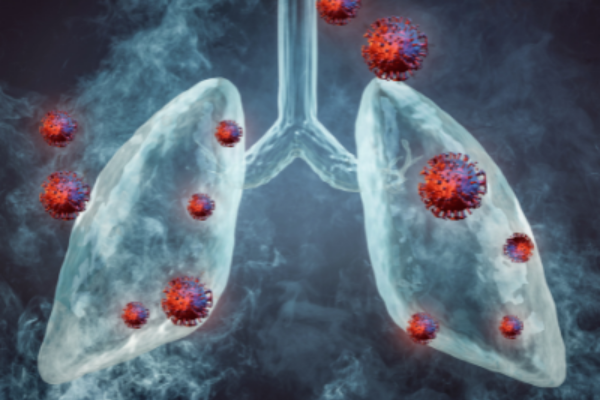Exacerbations are a common occurrence in patients with Alpha-1 Antitrypsin Deficiency. Patients with Alpha-1 classically develop a different pattern of lung disease from those with usual COPD. In Alpha-1-related COPD, exacerbations are often of greater frequency and duration than those in usual COPD. This is related to differences in the intensity of inflammation that occurs when there is not enough alpha-1 antitrypsin in the airway. Also, airway damage from exacerbations due to infections can result in airways more prone to the next infection.
In COPD, a worsening of the day-to-day symptoms that may require more treatment is an exacerbation. Anything that causes airway inflammation can lead to an exacerbation. This would include bacteria and viruses, inhaled particulates (dust and dirt and allergens), and fumes (cigarette smoke, wildfire smoke). This is why health practitioners often have a hard time figuring out the exact exacerbation cause. Exacerbations are the driving force for emergency department visits, hospital admissions, and, in severe cases, death.
Many characteristics of usual COPD and Alpha-1 COPD are similar; exacerbations are experienced by both groups of patients. However, one difference is that patients with Alpha-1 have more neutrophil elastase activity in the sputum during an exacerbation. Neutrophil elastase is an enzyme that is part of a powerful host defense that protects against some infections. It is also known as one of the most destructive enzymes in the body when unregulated. In normal conditions, this enzyme is regulated by alpha-1 antitrypsin in your body. In severely deficient patients the lack of Alpha-1 turns neutrophil elastase from a protective enzyme to a destructive enzyme allowing for increased inflammation in the airway. Exacerbations tend to be more frequent and last longer in some Alpha-1 patients than in usual COPD patients. This prolongs the elevated neutrophil elastase level and the lung destruction, worsens disease progression, and worsens quality of life. For that reason, patients in the Alpha-1 community are often told: “Don’t get sick!”
The definition of an exacerbation is any measure of change in shortness of breath, cough with mucus, or change in sputum color that lasts for at least two days. Typically, during an exacerbation, patients seek treatment for shortness of breath and sputum volume. But sputum color is equally important. It is a more reliable indicator of bacterial infection and the need for antibiotic treatment to reduce the exacerbation duration. In a mild exacerbation, without sputum color change, increasing the use of bronchodilators such as albuterol may resolve the exacerbation without other medications.
Exacerbations often last longer with Alpha-1 COPD. Experience with an individual’s own exacerbation length can inform how long to use antibiotics or steroids in future exacerbations. Prevention is better than anything else. The care that decreases exacerbation frequency includes pulmonary rehabilitation, any long-acting bronchodilator, and staying away from sick people. Using long-acting bronchodilators on a routine basis will help keep the airways open day and night, preventing an exacerbation. Then again, there are many people for whom bronchodilators work better during an exacerbation than on a day that is normal. Therefore, doctors often advise that patients use bronchodilators on a regular schedule during an exacerbation. Short-acting bronchodilators (like albuterol), better known as “rescue” inhalers, begin working within 5 minutes of inhalation and the effects can last between 4-6 hours. These medications are often used in periods of exertion, before and after. Many Alphas never use short-acting bronchodilators since emphysema symptoms tend to have less sudden onset of symptoms, compared to asthma.
There are very few scientific studies surrounding exacerbations in Alpha-1 but more studies are in the pipeline. Controlling the frequency and managing the severity of exacerbations could have a positive impact on the quality of life, disease progression, and prognosis for Alpha-1 patients.
References:
Sandhaus RA, Strange C, Zanichelli A, Skålvoll K, Koczulla AR, Stockley RA. Improving the Lives of Patients with Alpha-1 Antitrypsin Deficiency. Int J Chron Obstruct Pulmon Dis. 2020 Dec 10;15:3313-3322. doi: 10.2147/COPD.S276773. PMID: 33328731; PMCID: PMC7735792.
Smith DJ, Ellis PR, Turner AM. Exacerbations of lung disease in alpha-1 antitrypsin deficiency. Chronic Obstr Pulm Dis. 2021; 8(1): 162-176. doi: http://doi.org/10.15326/jcopdf.2020.0173.
